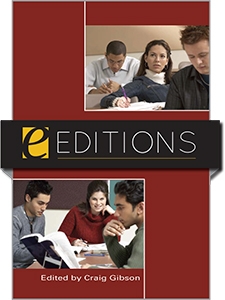
Student Engagement and Information Literacy--eEditions e-book
The download link for this product can be found on the final confirmation screen after you complete your purchase, and may also be accessed from your Account Profile. For more information about ALA eEditions file types and how to view them on eReaders, desktop computers, and other devices, see this page.
Primary tabs
You don't need to be an ALA Member to purchase from the ALA Store, but you'll be asked to create an online account/profile during checkout to proceed. This Web Account is for both Members and non-Members. Note that your ALA Member discount will be applied at the final step of the checkout process.
If you are Tax-Exempt, please verify that your account is currently set up as exempt before placing your order, as our new fulfillment center will need current documentation. Learn how to verify here.
- Description
- Table of Contents
- About the author
Student Engagement and Information Literacy addresses information literacy in a framework inspired by higher education scholarship and dialogue as it relates to student engagement. Articles are based on what librarians and faculty know about how students learn, how different learning environments affect engagement, and how different groups on campuses can collaborate on student engagement and learning. Contributors range from administrators, faculty members, and librarians, to professional association vice-presidents.
Acknowledgements
Introduction: Student Engagement and Information Literacy ……Craig Gibson
Chapter 1: The Other Dewey: John Dewey's Democracy and Education And Information Literacy . . . James Elmborg
Chapter 2: Librarians Enhancing Student Engagement: Partners in Learning That Build Bridges . . . . ..Adrianna Kezar
Chapter 3: Becoming Educated: Service Learning as Mirror . . . Margit Watts
Chaper 4: Ways of Thinking: Doing Research and Being Information Literate . . .Randy Burke Hensley
Chapter 5: The Winds of Change: Generation Y, Student Learning, and Assessment In Higher Education . . …Patricia Davitt Maughan
Chapter 6: Engaging the Future: Meeting the Needs of NetGen…..Jo Ann Carr
Chapter 7: Discovery Projects: Contextualized Research Experiences for College Sophomores . . . Nancy Shapiro and Katherine McAdams
Chapter 8: Personally Engaged Information Literacy in General Education through Information Ecology and Fieldwork . . . . . . . Darren Cambridge
Chapter 9: Learning, Engagement, and Technology . . . . . . . Joan Lippincott
Craig Gibson
Craig Gibson is professor and Professional Development Coordinator at The Ohio State University Libraries. He has also been Associate Director for Research and Education at Ohio State, with responsibilities for reference and research services, assessment, outreach and engagement, the libraries’ instruction program, and departmental libraries. He has served as a student mentor in Ohio State’s nationally recognized Second-Year Transformational Experience Program and as a faculty mentor in OSU’s University Institute for Teaching and Learning. Previously, he was Associate University Librarian for Research, Instruction, and Outreach at George Mason University Libraries; Head of Library User Education at Washington State University; and Reference/Instruction Librarian at Lewis-Clark State College. His current research interests focus on open educational practices, threshold concepts for information literacy, and models for collaboration between academic libraries and teaching and learning centers. Since 2000, he has taught in the ACRL Immersion Program, the signature professional development program for instruction librarians in the United States, and has consulted widely on the changing role of the subject librarian in academic libraries. He was editor of the ACRL Publications in Librarianship series from 2008 to 2013 and was cochair of the ACRL Information Literacy Standards Revision Task Force, a group that developed the Framework for Information Literacy for Higher Education in 2013–2015. He received the Miriam Dudley Instruction Librarian Award in 2008 and the ACRL President’s Special Recognition Award for Immersion Faculty in 2009.


